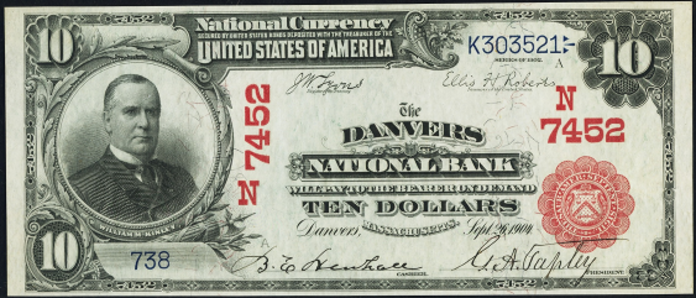Ten Dollar Notes › Nationals › 1902 Ten Dollar National Bank Notes › Kentucky Charters › 1902 $10 Clay Kentucky Farmers National Bank
Get Value Now
| Item | Info |
|---|---|
| Series | 1902 |
| Charter | #8943 Farmers National Bank of Clay, Kentucky |
| Year Chartered | 1907, 490 Banks Chartered |
| City Info | Clay is a home rule-class city in Webster County, Kentucky, in the United States. The population was 1,179 at the 2000 census. Settled in 1837, the city is named for the statesman Henry Clay. Clay is located at 37°28?41?N 87°49?15?W? / ?37.477969°N 87.820922°W. Source: Wikipedia |
| Similar Cities | 15 banks with similar city. First 12 below: 1. Clay Center, Kansas - First National Bank 2. Clay Center, Kansas - Peoples National Bank 3. Clay Center, Nebraska - First National Bank 4. Clayton, New York - First National Bank 5. Clay City, Kentucky - Clay City National Bank 6. Claysville, Pennsylvania - National Bank of Claysville 7. Claysville, Pennsylvania - First National Bank 8. Clayton, New York - National Exchange Bank 9. Clayton, New Mexico - First National Bank 10. Claysville, Pennsylvania - Farmers' National Bank 11. Clay City, Indiana - First National Bank 12. Claysburg, Pennsylvania - First National Bank |
| Seal Varieties | Red, Blue |
| See Also | If your note doesn't match try: 1. 1907 $10 Gold Certificate 2. 1901 $10 Legal Tender 3. 1908 $10 Silver Certificates |
| Other Info | 1. Value depends on notes known for charter, condition and market demand. |
| Neat Fact | Portrait of President William McKinley. |
No Obligations Offers and Appraisals
Please submit a good photo or scan. It will be identified and evaluated. Understand there may be subtle differences between the image you see above and your note. Signatures, design, markings and note condition will determine the offer price. Notes in Uncirculated or better condition receive the best offers.
Appraisals can be estimated for wholesale and retail prices. Wholesale is what dealers typically pay. Retail is what a collector might pay. Retail is slightly higher in most cases.
Please visit this page for USA Paper Money Reference. Do not treat this page as a reference guide, it is for appraisal and acquisition purposes only.
